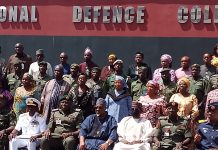By Agency Report
The Federal High Court, Abuja, on Wednesday, dismissed the suit challenging President Muhammadu Buhari from appointing 21 out of the 33 persons penciled down as judges in the High Court of the Federal Capital Territory (FCT).
Justice Okon Abang, in his judgment, held that the plaintiff lacked locus standi to institute the case in view of the fact that they have not shown any special interest as to confer on them the locus to commence the suit against the respective parties.
The News Agency of Nigeria (NAN) reports that the plaintiff, JRP Foundation Ltd/GTE, comprises about 15 Senior Advocate of Nigeria (SAN).
While President Buhari is the first defendant in the suit marked: FHC/ABJ/CS/602/2020, the NJC, the Judicial Service Committee of the FCT, Attorney General of the Federation (AGF), and the 21 nominees are the 2nd to 25th defendants respectively.
The plaintiff had asked the court to declare “that in its exercise of its constitutional duties to recommend suitable persons to the 2nd defendant as judges of High Court of FCT, Abuja, the 3rd defendant must only recommend such persons as have met the criteria and satisfied the conditions set out in the extant Guidelines and Procedural Rules for the appointment of judicial officers in Nigeria made by the 2nd defendant.
“That in exercising its constitutional duties to recommend to the 1st defendant (The President of the Federal Republic of Nigeria), from the list submitted by the 3rd defendant, persons to be appointed judges of High Court of FCT, Abuja, the 2nd defendant can only recommend such persons as have met the criteria and satisfied the conditions set out in its extant Guidelines and Procedural Rules for the appointment of judicial officers in Nigeria.
“That the 5th to 25th defendants, having failed to meet the criteria and satisfied the conditions set out in the extant Guidelines and Procedural Rules for the appointment of judicial officers in Nigeria, are not suitable persons for nomination for appointment as judges of High Court of the FCT, Abuja, within the purview of Paragraph 2(1) of Part III of the Third Schedule to the Constitution of the Federal Republic of Nigeria 1999.”
The plaintiff also urged the court to declare that the Judicial Service Committee of the FCT acted improperly, in bad faith and gross abuse of power vested in it when it submitted the nominations of these persons to the NJC for appointment as judges.
The applicant asked the court to declare that in view of this, the affected persons cannot be appointed by the 1st defendant as judges.
The applicant sought the court order to set aside the recommendation of the nominees by the 2nd defendant to the 1st defendant for appointment.
Delivering the judgment, Justice Abang, who noted that the plaintiff was not party to the procedure for the appointment of the judicial officers and that they had not participated in any way, said the applicant’s interest was vague.
The judge also held that the court had no jurisdiction over the matter as argued by the defendants since the subject matter had to do with employment of the persons recommended by the National Judicial Council (NJC) to be appointed as judges by President Buhari.
Abang held that the application by the plaintiff to transfer the matter to National Industrial Court in accordance with Section 22 of the Federal High Court Rule would be baseless since the applicant’s legal right had to be determined first.
The judge, thereafter, dismissed the suit based on the two grounds.
Speaking to NAN shortly after the judgment, Counsel to the 1st and 4th defendants (President Buhari and Attorney General of the Federation respectively), Ibrahim Jibril, commended the judge for the judgment.
He said the judgment was based on the preliminary objection filed by respective parties in the case.
He said the plaintiff had not shown any special interest as to confer on them the locus to commence the suit against the defendants. “In view of the fact that the plaintiff has no locus, transferring the matter will be to what issue or on what basis?” Jibril asked.
(NAN)













